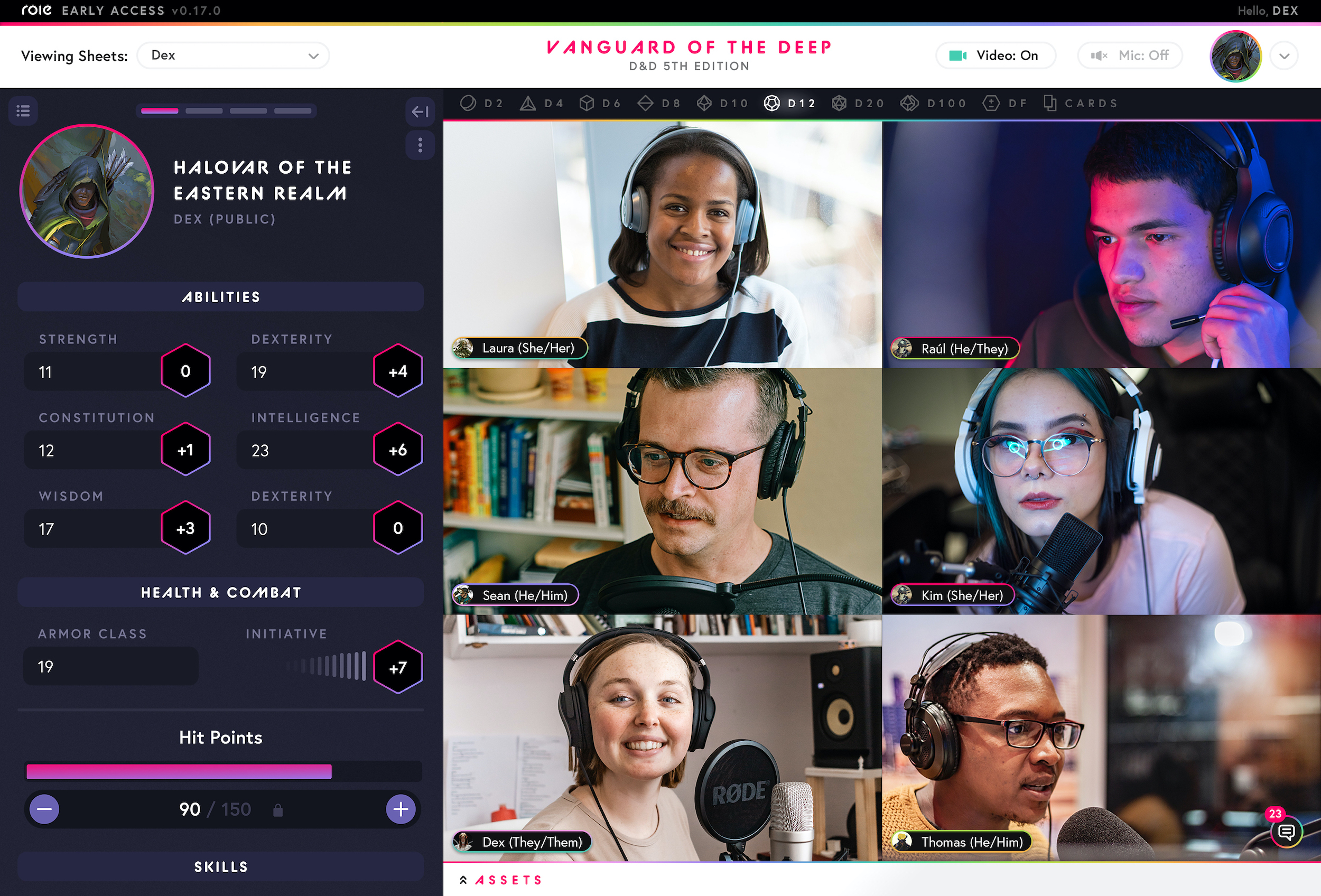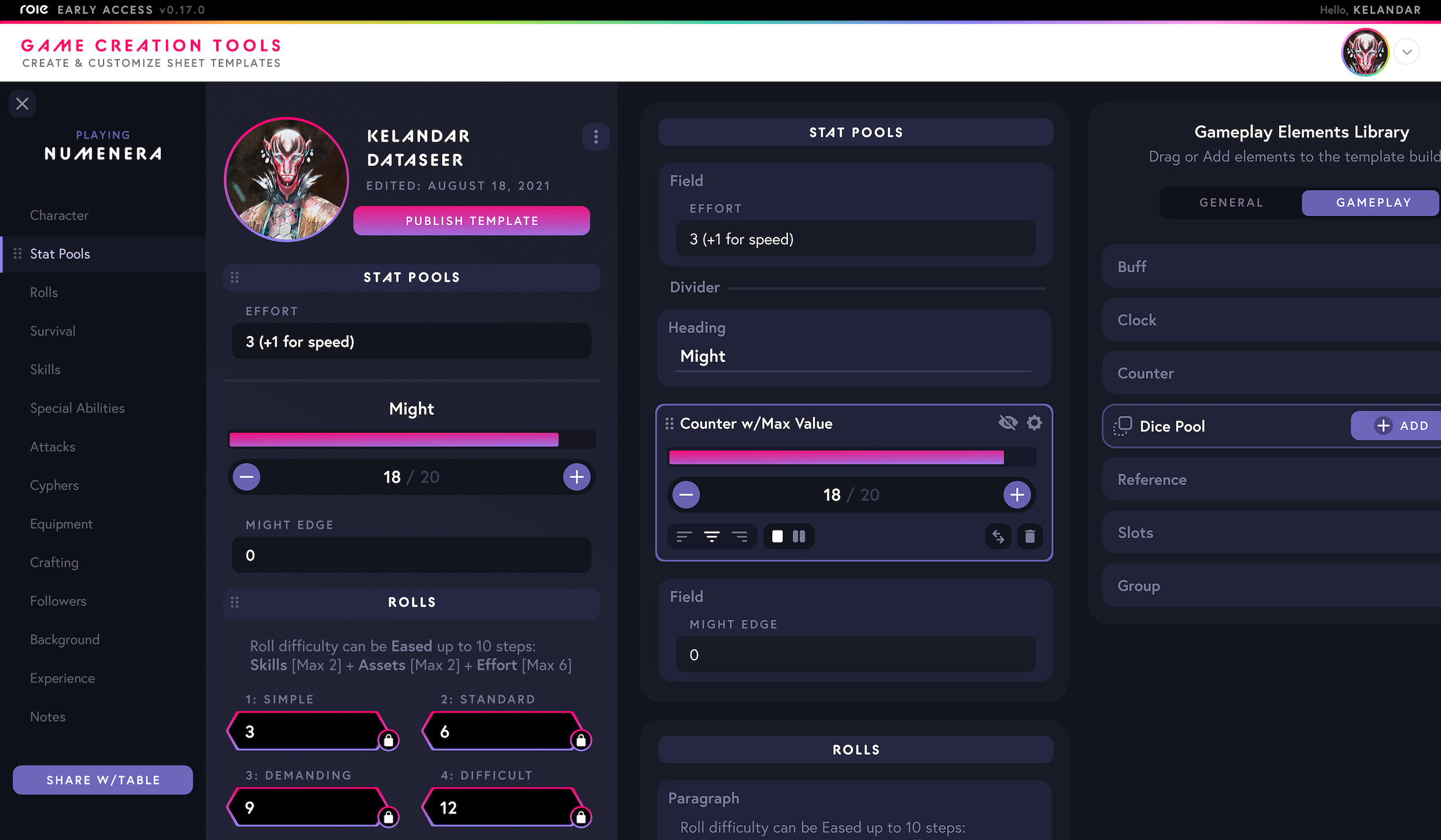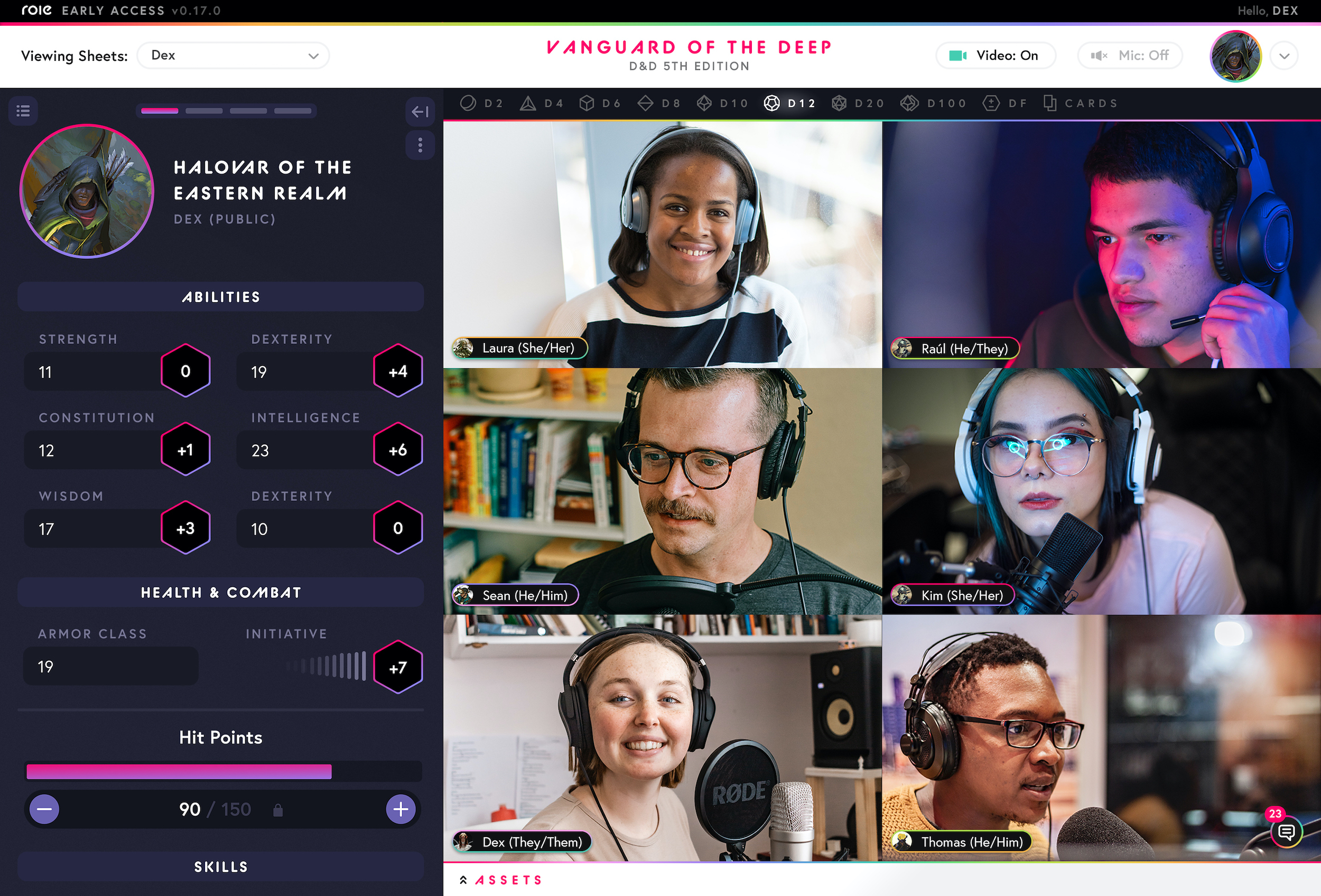The new app is called watchGPT and as I tipped off already, it gives you access to ChatGPT from your Apple Watch. Now the $10,000 question (or more accurately the $3.99 question, as that is the one-time cost of the app) is why having ChatGPT on your wrist is remotely necessary, so let’s dive into what exactly the app can do.
NEWS
Role’s video role-playing platform makes a $2.75M charm attempt on the burgeoning tabletop world

Tabletop gaming is in the middle of a historic boom, despite recent restrictions imposed on in-person gatherings by COVID. The tools adopted by game masters and casual players to play remotely are powerful, but not always the easiest to use or adopt. Role hopes to change that with a super-accessible video platform focused on the social aspect of role-playing games, and it has raised a $2.75 million seed round to do so.
It’s hard to say what has powered the incredible growth of the tabletop gaming space, which just a few years ago was perceived as a sleepy realm of basement-dwelling nerds, a niche within a niche. But it was a different kind of sleeping giant, one that has proven to be immensely diverse, valuable and surprisingly tenacious in the face of the pandemic.
Some platforms, like Roll20 and Fantasy Grounds, have seized on this opportunity to provide online video collaboration platforms for playing games like D&D, strategy titles and many others of the general tabletop type.
But Logan Dwight and Ian Hirschfeld, co-founders of Role, felt these approaches tended to emphasize the mechanics over what they felt was a more important aspect of RPGs.
“We asked ourselves, why is it that people, when they have all these options, choose to play D&D on the internet? And what we figured out is, it’s the people,” said Dwight. “The game lives in the minds of the people, a shared social experience. It’s about the conversation, the face-to-face interactions.”
This is the start of something new, they said — and big. As an analogue, they referred to the social gaming explosion a decade ago.
“People always find a way to play. Because we had social media platforms and mobile phones then, we were socializing over those — so we naturally looked for ways to play over them,” they said. “We’re at another one of those inflection points now with the explosion of online video and the creator economy in gaming. Video has become so good and so ubiquitous it’s becoming the dominant way people socialize — and then what naturally happens is we look for a way to play. And it turns out the, answer was right under our noses, and it’s been there since the ’70s: it’s role playing, a game that takes the form of conversation.”
Role was designed from the ground up to smooth out and simplify how the complex mechanics of these games are implemented, putting the players visually and cognitively at the forefront. After all, when you’re playing D&D or another game around the table, you spend most of your time looking at each other, not the game board — because it’s a game and you’re having fun with each other, right?
Of course, it’s easy to say the face-to-face interactions should be front and center, but the truth is these games are mechanically complicated and involve sheets, dice, maps, rulebooks and so on. Dwight said the problem here is not so much keeping them always in view, but making them simple and intuitive to access and involve in gameplay.
Take a character sheet with some attributes and associated bonuses, and a standard combat encounter. Depending on how well the GM has prepped, it may be that the dice rolls need to have bonuses added manually, and the results compared manually to the defending monster’s sheet. But if the bonuses, the dice and the monster’s stats are all aware of one another, you know if you hit as soon as the die is cast.

It looks complicated, but compared with scripting it manually, this is a cakewalk. Image Credits: Role
This can be done in many games, but it’s not always easy, and becomes much harder the further one goes from official, canon rulebooks. House rules are common enough, but these days there are entire variant game types being built out from open-license rulebooks that have no “official” support from a major gaming company like Wizards. Prepping a game for play online might be weeks of work that’s relatively technically demanding.
Some GMs and creators take pleasure in the intricacy of these systems, but as Dwight pointed out, the expansion of the community means more people are coming to this from non-gaming and non-tech backgrounds.
“The core skills people are bringing to this are that they’re a writer or something. So the ability to create together needs to be really easy and really powerful,” they said. “We want to give people like… a Squarespace for tabletop RPGs. It’s a WYSIWYG editor, the RPG equivalent of a box of LEGO. You can make a whole set of templates for whatever game you want to run, tweak sheets, create animations, all without having to touch code, and you can share it easily.”
The platform has already seen major growth in user-created campaigns and variants for games designed to be built upon, like Mörk Borg and Lancer, with thousands being shared.
Role first raised money via Kickstarter (though the idea goes back to 2015), then via some angel funding, but this seed round brings in their first proper VC money. The $2.75 million round is co-led by Konvoy and London Venture Partners, with whom Dwight said they were pleased to find willing partners who understood the opportunity perfectly. That’s a feat, considering the skyrocketing value and diversity of tabletop has taken even industry veterans by surprise.
The money is going toward effecting the lessons the company has learned from its early adopters, with a renewed focus on ease of use, accessibility and extensibility. As for making money, the company intends to do so through a marketplace for games and scenarios, and for premium features like extra online storage and so on. But for regular users who just want to play with friends, Role is free to sign up for and use right now.
Facebook Faces Yet Another Outage: Platform Encounters Technical Issues Again

Uppdated: It seems that today’s issues with Facebook haven’t affected as many users as the last time. A smaller group of people appears to be impacted this time around, which is a relief compared to the larger incident before. Nevertheless, it’s still frustrating for those affected, and hopefully, the issues will be resolved soon by the Facebook team.
Facebook had another problem today (March 20, 2024). According to Downdetector, a website that shows when other websites are not working, many people had trouble using Facebook.
This isn’t the first time Facebook has had issues. Just a little while ago, there was another problem that stopped people from using the site. Today, when people tried to use Facebook, it didn’t work like it should. People couldn’t see their friends’ posts, and sometimes the website wouldn’t even load.
Downdetector, which watches out for problems on websites, showed that lots of people were having trouble with Facebook. People from all over the world said they couldn’t use the site, and they were not happy about it.
When websites like Facebook have problems, it affects a lot of people. It’s not just about not being able to see posts or chat with friends. It can also impact businesses that use Facebook to reach customers.
Since Facebook owns Messenger and Instagram, the problems with Facebook also meant that people had trouble using these apps. It made the situation even more frustrating for many users, who rely on these apps to stay connected with others.
During this recent problem, one thing is obvious: the internet is always changing, and even big websites like Facebook can have problems. While people wait for Facebook to fix the issue, it shows us how easily things online can go wrong. It’s a good reminder that we should have backup plans for staying connected online, just in case something like this happens again.
NEWS
We asked ChatGPT what will be Google (GOOG) stock price for 2030

Investors who have invested in Alphabet Inc. (NASDAQ: GOOG) stock have reaped significant benefits from the company’s robust financial performance over the last five years. Google’s dominance in the online advertising market has been a key driver of the company’s consistent revenue growth and impressive profit margins.
In addition, Google has expanded its operations into related fields such as cloud computing and artificial intelligence. These areas show great promise as future growth drivers, making them increasingly attractive to investors. Notably, Alphabet’s stock price has been rising due to investor interest in the company’s recent initiatives in the fast-developing field of artificial intelligence (AI), adding generative AI features to Gmail and Google Docs.
However, when it comes to predicting the future pricing of a corporation like Google, there are many factors to consider. With this in mind, Finbold turned to the artificial intelligence tool ChatGPT to suggest a likely pricing range for GOOG stock by 2030. Although the tool was unable to give a definitive price range, it did note the following:
“Over the long term, Google has a track record of strong financial performance and has shown an ability to adapt to changing market conditions. As such, it’s reasonable to expect that Google’s stock price may continue to appreciate over time.”
GOOG stock price prediction
While attempting to estimate the price range of future transactions, it is essential to consider a variety of measures in addition to the AI chat tool, which includes deep learning algorithms and stock market experts.
Finbold collected forecasts provided by CoinPriceForecast, a finance prediction tool that utilizes machine self-learning technology, to anticipate Google stock price by the end of 2030 to compare with ChatGPT’s projection.
According to the most recent long-term estimate, which Finbold obtained on March 20, the price of Google will rise beyond $200 in 2030 and touch $247 by the end of the year, which would indicate a 141% gain from today to the end of the year.
Google has been assigned a recommendation of ‘strong buy’ by the majority of analysts working on Wall Street for a more near-term time frame. Significantly, 36 analysts of the 48 have recommended a “strong buy,” while seven people have advocated a “buy.” The remaining five analysts had given a ‘hold’ rating.

The average price projection for Alphabet stock over the last three months has been $125.32; this objective represents a 22.31% upside from its current price. It’s interesting to note that the maximum price forecast for the next year is $160, representing a gain of 56.16% from the stock’s current price of $102.46.
While the outlook for Google stock may be positive, it’s important to keep in mind that some potential challenges and risks could impact its performance, including competition from ChatGPT itself, which could affect Google’s price.
Disclaimer: The content on this site should not be considered investment advice. Investing is speculative. When investing, your capital is at risk.
NEWS
This Apple Watch app brings ChatGPT to your wrist — here’s why you want it

ChatGPT feels like it is everywhere at the moment; the AI-powered tool is rapidly starting to feel like internet connected home devices where you are left wondering if your flower pot really needed Bluetooth. However, after hearing about a new Apple Watch app that brings ChatGPT to your favorite wrist computer, I’m actually convinced this one is worth checking out.
-

 MARKETING6 days ago
MARKETING6 days agoHow Tagging Strategies Transform Marketing Campaigns
-
SEARCHENGINES7 days ago
Daily Search Forum Recap: May 3, 2024
-

 MARKETING7 days ago
MARKETING7 days agoTinuiti Recognized in Forrester Report for Media Management Excellence
-

 SEO7 days ago
SEO7 days agoGoogle Performance Max For Marketplaces: Advertise Without A Website
-

 SEARCHENGINES5 days ago
SEARCHENGINES5 days agoThe Industry Mourns The Loss Of Mark Irvine
-

 MARKETING4 days ago
MARKETING4 days agoA Recap of Everything Marketers & Advertisers Need to Know
-

 MARKETING5 days ago
MARKETING5 days agoThe key to correcting the C-suite trust deficit
-

 SEO6 days ago
SEO6 days agoWhat Is Social Listening And How To Get Started














